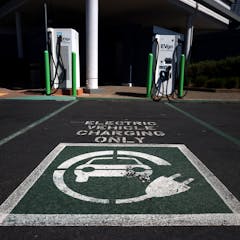
Articles on Climate change
Displaying 1261 - 1280 of 6951 articles

The cost of sustainability is no longer a deal breaker for some business owners, but more can be done to encourage decarbonisation efforts.

More homes are burning in wildfires in nearly every Western state. The reason? Humans.

In 2015, 6,700 premature deaths were caused by urban heat – this can be reduced by a third by planting more trees.

The ocean twilight zone could store vast amounts of carbon captured from the atmosphere, but first we need a 4D monitoring system to ensure ramping up carbon storage does no harm.

If the EV transition focuses exclusively on drivers in privately owned cars, it won’t meet many Americans’ mobility needs, particularly in underserved communities.

When species naturally hybridise, the influx of genes can reduce their risk of extinction as climate change shrinks their habitats.

The climate crisis will necessitate change to business-as-usual approaches to the arts.

Mountaineer and scientist Will Steffen said climbing was similar to science: “That’s the buzz you get in science when you solve a big problem and suddenly see how it all fits together”

A new image has been taken of the whole Earth 50 years after the first - revealing noticeable changes to its surface.

Record-breaking floods in Auckland could see insurance costs in parts of the city rise significantly – some areas may even become uninsurable.

Culling water buffalo is expensive. What if land managers could earn carbon credits for controlling the numbers of these methane-belching animals?

It was in the 1990s that the idea of Christian environmental stewardship disappeared from the rhetoric of the religious right, paving the way for the anti-environmental position it holds today.

Close relatives of primates adapted to life in the High Arctic 52 million years ago – this may offer insight into future changes in the Arctic.

The more the climate warms, the heavier the storm rainfalls will become. The Auckland emergency shows how urgently adaptive measures are now needed.

An alternate timeline that ends with a Nobel prize for Exxon’s CEO.

Queensland is still clearing large tracts of land to run more cattle. This comes at a huge cost to our native animals and plants.

From bushfires in Australia to insect-borne disease outbreaks in Colombia.

California is one of the world’s largest economies, and it’s aiming for net-zero emissions by 2045. A transportation expert involved in the plan explains why it just might succeed.

In 1945, nuclear scientists established the Doomsday Clock to warn against human-made threats. This week, the clock’s display has brought us the closest we have ever been to global disaster.

Policies that encourage the use of low-carbon technology like heat pumps can help motivate residents to decarbonize their homes.





